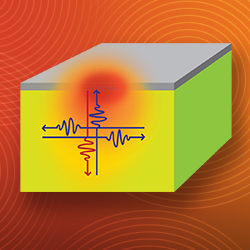Thermal Radiation at the Nanoscale and Applications
 The ability to control thermal radiation is important for a broad range of applications, including thermal management, spectroscopy, optoelectronics, and energy-conversion devices. Nanostructured materials, such as metamaterials and photonic architectures, offer new opportunities for shaping the infrared thermal spectrum and improving the performance of thermal devices. In addition, there has been a paradigm shift from the familiar laws of thermal radiation derived over a century ago, valid only when the involved length scales are much larger than the thermal wavelength (around 10 µm at room temperature), to a general framework known as fluctuational electrodynamics that allows calculations of radiative heat transfer for arbitrary sizes and distances. Near-field radiative heat transfer and thermal emission in systems of sub-wavelength size can exhibit super-Planckian behaviour, i.e. flux rates several orders of magnitude larger than that predicted by the Stefan–Boltzmann (or blackbody) limit. These effects can be combined with novel materials, e.g. low-dimensional or topological systems, to yield even larger modifications and spectral selectivity.
The ability to control thermal radiation is important for a broad range of applications, including thermal management, spectroscopy, optoelectronics, and energy-conversion devices. Nanostructured materials, such as metamaterials and photonic architectures, offer new opportunities for shaping the infrared thermal spectrum and improving the performance of thermal devices. In addition, there has been a paradigm shift from the familiar laws of thermal radiation derived over a century ago, valid only when the involved length scales are much larger than the thermal wavelength (around 10 µm at room temperature), to a general framework known as fluctuational electrodynamics that allows calculations of radiative heat transfer for arbitrary sizes and distances. Near-field radiative heat transfer and thermal emission in systems of sub-wavelength size can exhibit super-Planckian behaviour, i.e. flux rates several orders of magnitude larger than that predicted by the Stefan–Boltzmann (or blackbody) limit. These effects can be combined with novel materials, e.g. low-dimensional or topological systems, to yield even larger modifications and spectral selectivity.
The goal of this Special Topic Collection is to provide an overview of the flourishing field of nanoscale thermal radiation and its key applications, gathering original and impactful works.
Topics covered include, but are not limited to:
- Near-field thermal radiation: impact of materials and nanostructuring
- Thermal management and radiative cooling
- Radiative heat transfer with metamaterials
- Novel energy-conversion devices including thermophotovoltaics or photonic refrigeration
- Radiative lithography and data processing including heat-assisted magnetic recording
- Thermal logics
- Heat engines with photons
- Interplay with other fluctuational-electrodynamics phenomena, such as Casimir-Van Der Waals forces and torques, near-field friction, etc.
- Nonequilibrium phenomena in active systems, including transient effects
Guest Editors
Pierre-Olivier Chapuis, CNRS
Bong Jae Lee, KAIST
Alejandro Rodriguez, Princeton University
